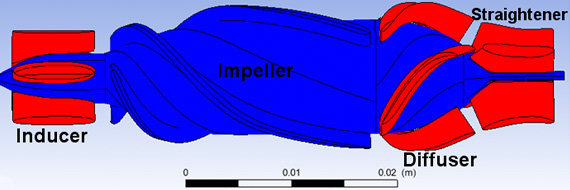BioCirc Research Laboratory
 Pictured: A Pediatric Ventricular Assist Device (PVAD) under development to augment blood flow from the native ventricle to mechanically support the systemic circulation in patients with single ventricle or biventricular circulations.
Pictured: A Pediatric Ventricular Assist Device (PVAD) under development to augment blood flow from the native ventricle to mechanically support the systemic circulation in patients with single ventricle or biventricular circulations.
Overview
Congestive heart failure is a progressive and debilitating disease that affects tens of millions of people worldwide. In the U.S., more than 7 million people suffer from heart failure, and more than 500,000 new cases are diagnosed per year. This costs the healthcare industry tens of billions of dollars annually, and only 2500 donor hearts are available each year. Thousands are registered awaiting a donor heart; many of those patients who are on the waiting list die. Thus, many patients would benefit from temporary or long-term mechanical circulatory support (MCS). To address this unmet need, the BioCirc Laboratory at Drexel seeks to improve the treatment strategies and therapeutic options for pediatric and adult patients suffering from acquired or congenital heart disease by developing unique features for inclusion in the design of blood pumps and to develop entirely new designs of blood pumps for patients with single ventricle or biventricular circulations as a bridge-to-transplant, bridge-to-recovery, or destination therapy. Specifically, we are actively working on the following projects:
- Mechanical Cavopulmonary Assistance
- Dragon Heart
- External Compression Therapy
- Collapsible Impeller
- Patient Specific Modeling and Surgical Planning
- Ventricular Assist Devices
- Human Factors Engineering of Medical Devices
- Lymphatic Pump
Website
BioCirc Research Laboratory